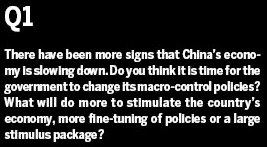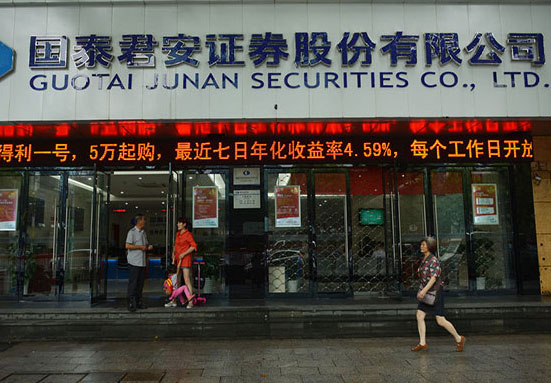

|
 |
Wei Jianguo
Secretary-general of the China Center for International Economic Exchanges, and a guest economist of China Daily
 |
The economic slowdown is under way, but the hardest time of the year has yet to come. I think the economy will follow a downward trajectory until the fourth quarter, amid dim global prospects.
Whether Greece will exit the eurozone and the aftermath is uncertain. In case Greece exits, which personally I think is very likely, what would that mean for Germany, France and other eurozone members. Problems may easily flare up in the area and bring more uncertainties to China as the EU is China's largest trading partner.
The US economy has gradually rallied, but largely due to the lingering impact of the last round of quantitative easing instead of organic growth, and the US never ruled out further quantitative easing.
The economic outlook for (China's) neighboring countries such as Japan and South Korea is not very optimistic as well.
I'm not inclined to large-scale stimulus plans. Policy adjustment should tilt toward expanding exports and supporting small to medium-sized enterprises.
Meanwhile, the government should expand support for State-owned companies because they are pillars of the real economy, and give great importance to countering further economic recession.
 |
Last year, the country was under great pressure from imported inflation caused by soaring global oil and grain prices and adverse weather.
The slipping (inflation) figure showed that the government's regulation was effective. Inflation remains a problem but not a major concern in the coming months.
Prices of steel and agricultural products will continue to decline in the coming months along with the economic slowdown.
Consumption remains weak and customers are reluctant to pay more. Given lethargic market conditions and abundant supply, I think the deceleration of inflation is likely to continue.
 |
Real estate should follow government-dominated regulation, but market regulation is also necessary. A weak real estate industry has affected downstream industries including steel, cement, household appliances and furniture.
I think it's a good time to moderately relax the regulations. The country should accelerate construction of affordable low-cost housing to bolster the economy and appropriately relax regulations on commercial property and property in some areas.
 |
The government should further lower import taxes on luxury goods to promote domestic demand and boost trade. Cutting tariffs is crucial in fanning rich consumers' enthusiasm to buy such products domestically.
Also, measures need to be taken to bolster consumption of low-income people by expanding investment in rural areas. The country should make more effort in building a better social security system, housing system and education system to free consumers from worry and gradually upgrade their consumption structure to higher levels.
 Business giants celebrate the success of entrepreneurship
Business giants celebrate the success of entrepreneurship
 Top 10 Chinese businesswomen in 2015
Top 10 Chinese businesswomen in 2015
 Female robot sings in Shanghai
Female robot sings in Shanghai
 21st Lanzhou Investment and Trade Fair kicks off in Lanzhou
21st Lanzhou Investment and Trade Fair kicks off in Lanzhou
 Top 10 Chinese brokerage firms in H1 of 2015
Top 10 Chinese brokerage firms in H1 of 2015
 Fancy sculptures sparkle in Chongqing
Fancy sculptures sparkle in Chongqing
 Top 10 most competitive Chinese cities in Belt and Road Initiative
Top 10 most competitive Chinese cities in Belt and Road Initiative
 Italian designer tailors success in China
Italian designer tailors success in China